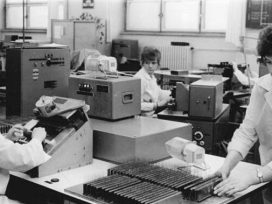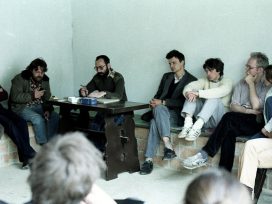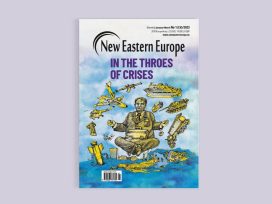Bulgaria’s post-1989 demostalgia
In the latest article from Eurozine partner journal Transit’s landmark 50th edition, Elitza Stanoeva surveys the hopes, dreams and disillusionment of politics in Bulgaria since 1989 – and includes a few personal insights.
My personal memory of 10 November 1989 is one of confusion and embarrassment. Ten years of age at the time, I came home from school and found my parents laughing and jumping around the kitchen like madmen. Through uncontrolled laughter, they finally answered my questions about what was going on with the brief statement: ‘Todor Zhivkov has fallen.’ Having recently joined the ranks of the pioneers, a membership extended to all third-graders, I was sufficiently indoctrinated to object through tears ‘But he is such a good man’, which only added to their exultation.
In reality, our ‘breakdown of communism’ one day after the fall of the Berlin Wall was a palace coup rather than a triumph of revolutionary momentum.1 With Soviet blessing, the Politburo of the Bulgarian Communist Party demanded the resignation of Todor Zhivkov, party leader since 1954, and on 10 November he handed it in officially during a televised party plenum.2 Less of a regime change than elsewhere in Eastern Europe, this event did not undermine the communists’ grip on power as state control was passed to Petar Mladenov, Minister of Foreign Affairs since 1971. The party – soon to be renamed to Bulgarian Socialist Party (BSP) – committed itself to organizing free elections with the hope of retaining control. With the name change, the BSP washed its hands of responsibility for the abuse of power by the former regime by putting Zhivkov on trial for communist crimes.3
In the months that followed 10 November, which we celebrate as our moment of change despite its shaky take-off, change was indeed experienced on the streets as people embraced their new freedom to protest and politics engulfed us all. Not being left out of the sweeping politicization of society, my classmates and I joined our parents on the squares, sang ‘Wind of Change’ and native hymns to democracy, and replaced the faces of Michael Jackson and Madonna from our safety-pin badges with the logos of opposition parties cut from rally flyers.
In a signal that the new party maintained its hold on the old levers of power, the BSP won the first free multiparty elections in June 1990 with an outright majority of 211 seats out of 400.4 A month later, however, Mladenov was forced to step down from the presidency after footage from the protests months earlier was released in which he was caught on tape saying to his aides ‘It would be better if the tanks could come.’5
While our parents confronted the sturdiness of old practices of governance, we minors took our own share of cosmetic changes in the more trivial school setting. The Russian language quickly disappeared from the mandatory curriculum and instead we were introduced to Western languages with old textbooks replete with tropes of revolutionary progress. Well into the mid-1990s, in geography classes we still learned by heart meaningless numbers concerning the output of mines and factories that by then had been closed as the collateral damage of post-communist privatization; in history, our teacher dictated lessons on ancient civilizations while our textbooks underwent protracted revision, with the recent past remaining a puzzle for educators.
Democracy half-way
In short, in 1989 politics became exciting. But with the growing disillusionment with the transition over the following decades, a generally shared acknowledgement to date is that Bulgaria failed in its leap from exciting politics on the square to the routine politics of checks and balances, and the rule of law. While the strenuous work of filling the newly gained democracy with concrete democratic substance was on hold, Bulgaria rushed headlong towards its dark side. Democracy was compromised by endemic political corruption and party clientelism, while the free market was commandeered by mafia organizations who upgraded their activities from street racketeering to private security and insurance, then diversified their portfolios further by building monopolies ranging from tobacco production to the media.6 Not surprisingly, corruption and the mafia, the two enfants terribles of Bulgaria’s transition to democracy and the market economy, found a mutually beneficial union in oligarchic structures. And the multiparty system that emerged after 40-odd years of one-party rule was reduced to an unscrupulous scramble for votes. While the media often fan racist sentiments by peddling an image of Roma ghettoes whose inhabitants sell off their votes for free meatloaves and beer on election day, and of Bulgarian-Turkish communities voting as loyal vassals of their feudalist ethnic party, the truth is that every small settlement, where votes are scarcely anonymous, is vulnerable to pressure. Long forgotten in the distribution of basic services, villages as well as small towns dependent on a single corporate employer are blackmailed into sustaining a certain party affiliation to keep their municipal funds or jobs.7
In addition to manifestations of structural injustice, the flexibility of parties on values and agendas bred a number of oddities in the Bulgarian political process. Among those, a particularly sensational example was the return of the former king, Simeon Saxe-Coburg-Gotha, after half a century of exile. Without denouncing his royal claims, he became prime minister of the republic when the National Movement Simeon II (NDSV) won the election in 2001 with 43%, thanks to the popular expectation that the mysterious king would act as a deus ex machina.8 As the main achievement of this government was to restore Saxe-Coburg-Gotha’s ownership over nationalized royal estates, in the next election cycle his party lost more than half of its previous support but remained in power through yet another political oddity. The tripartite coalition formed in 2005 represented a union of the BSP with two unlikely allies: the NDSV, built around a king who had been sent in exile by the communists, and the Movement for Rights and Freedoms (DPS), which was nominally established in opposition to the communists’ assimilation campaign against the Muslim population in the late 1980s. This coalition would be remembered as the most unprincipled political alliance in a partyscape that is already notorious for its lack of principles.
When Simeon Saxe-Coburg-Gotha withdrew from active participation in Bulgarian political life, the NDSV waned into insignificance despite trying to change its identity by inserting a new name under the old abbreviation. A far more significant legacy of Simeon’s short political career was the speedy rise of Boyko Borisov to power. Having served as a firefighter under communism, Borisov seized the new business opportunities after 1989 by founding a private security company well positioned within the Bulgarian mafia landscape.9 This entrepreneurial path would eventually place him in the role of a bodyguard first to Todor Zhivkov during his house arrest and later to Simeon Saxe-Coburg-Gotha. Under the latter’s government, Borisov’s career skyrocketed from the shadiest sector of the economy to the top level of politics, where he ascended from chief secretary of the Ministry of Interior to mayor of Sofia, and finally prime minister (2009-2013; 2014-2016), as the founder and leader of Citizens for European Development of Bulgaria (GERB).
A fractured ‘civil society’
While Bulgarian democracy slid into corruption, ‘civil society’, another catchphrase of 1989-optimism, slowly disappeared from the vernacular of public activism to be replaced by the divisive notion of the intellectual elite in the capital and a manipulated electoral mass in the countryside. As ‘civil society’ was reduced to a symbolic chapter in NGOs’ funding schemes, the growing sense of unbridgeable divides eroded any commitment to social solidarity.
This fallout is particularly evident in the chronology of Bulgarian protests after 1989. In early 1997, the country went through a massive upheaval caused by hyperinflation.10 Directed against a BSP government, it built upon the protest cycle of 1989-1990 and the general sense of despair created a spirit of solidarity across all segments of society. The next peak of protest activities, in 2013, was by contrast scarred by a societal divide emerging out of two cycles of dissent: protests in February triggered by rising electricity prices and leading to the resignation of the GERB cabinet, and summer protests triggered by the appointment of Delyan Peevski, an epitome of oligarchic interests, as the head of national security under the subsequent BSP-led coalition.11 While both protests had much in common – the first rallied against monopolies and the second against oligarchy – solidarity between the two was quickly compromised under pressure from the outdated divide between the ‘left’ communist establishment and the ‘right’ democratic opposition. In an attempt to discredit the second protest against their own government, BSP activists declared it a middle-class phenomenon of ‘new professionals’ too spoiled by the gains of their international CVs and NGO networks to sympathize with the economic plight of the earlier protesters.12 Trying to invert this manufactured opposition of moral demands vs. bread riots, public intellectuals on the other side of the fence reinforced its divisiveness by promoting an image of ‘the beautiful and smart summer protesters’ in contrast to their poverty-driven predecessors.13
Reinventing the left-right divide
Instead of consolidating popular discontent with the many faces of Bulgarian corruption, the protest cycle of 2013 rekindled an old left-right opposition. Ever since 1989, the major divide in the Bulgarian political landscape has been democrats vs. former communists. This translates into a left-right opposition that makes little sense in any Western context. Although we have long had a societal consensus about this ‘lost in translation’ problem, centre-right parties in Bulgaria still capitalize on the post-communist association between the ‘right’ and liberal democracy, while at the same time veering away from liberal values and thus living up to the more conventional definition of right-wing.
Channelling anti-communist sentiments, the new political formation that emerged out of the summer protest movement, the centre-right Reformist Bloc (RB), portrayed itself as a ‘new rightist project’, thus claiming pedigree from the ‘democratic forces’ of 1989.14 Backed by such an affinity, the RB was misconstrued by part of its electorate as a liberal party although its own self-representation omits this label. Soon those voters were proven wrong when the RB healthcare minister proposed that Roma should be cut off from certain healthcare services and the RB education minister engaged in a series of school reforms enhancing ‘patriotic education’.15
While the ‘democratic right’ shifts further away from the centre, the nominally ‘left’ party, the BSP, rides the same populist scaremongering wave by suggesting that the EU is engineering an ‘ethnic change’ in the country by forcing Bulgaria to accept refugees.16 In this, both ‘left’ and ‘right’ take a cue from the far-right parties that have surged in popularity over the last 12 years and which attack any commitment to the protection of minority rights or to trans-border solidarity as treason. Echoing the anti-liberal rhetoric that is gaining ground from Central Europe to Russia, a war on ‘liberasty’ (a highly derogative term combining ‘liberal’ and ‘pederasty’) has become a militant banner against any initiative in support of diversity – from human rights organizations, to pride parades, to volunteers helping refugees, to NGOs promoting equal opportunities for Roma.
As adherence to liberal values declines, social welfare falls prey to neoliberalism. In the economic sphere, the ‘left’ also differs little from the ‘right’: a number of economic policies favouring corporate interests over the needs of low-income groups were enforced by BSP-led governments. The left-right opposition therefore seems passé, concealing if anything the actual battle between conservative and liberal values as well as between social inclusion and exclusion. For political parties, however, it is still a convenient device to exploit voters’ nostalgia on both fronts.
Ostalgie versus ‘demostalgie’
Public commentators in Bulgaria regularly express concern about so-called Ostalgie, the German term signifying nostalgia for the times of communism.1718 This sentiment is rarely anything more than retrospective embellishment of the past fuelled by longing for one’s youth, especially in the case of retirees who can hardly sustain themselves on their meagre pensions without cutting corners on basic needs like heating and meat consumption.19 While this sentiment is capitalized by the BSP securing a stable electorate among the elderly, the proliferating centre-right projects manipulate nostalgia for a different chronotope, which by analogy I would call ‘demostalgie’ – the desire to relive the days of ‘political innocence’ at the dawn of democracy, when people celebrated their new freedoms in the public square.
This demostalgie is therefore driven by unfulfilled political expectations and romanticizes the 1989 situation, when politics had a cause as the opposition championed human rights and civil liberties. Although severe economic hardships followed – a rationing system and power cuts in 1990 succeeded by price hikes and spiralling inflation that reached its peak in 1997 – this was initially perceived as the price to be paid for a better future. Instead, corruption was entrenched within a new political class that represents a comfortable merger of old communist apparatchiks, self-proclaimed ‘dissidents’ whose credentials are tainted by links either with the former security services or the current oligarchy, and new actors who are ready to sacrifice their declared goals and principles in order to stay in power. Against this gloomy background, Bulgaria’s accession to the EU in 2007 gave citizens some sense of accomplishment and promise for change but did not assuage the frustrated feeling that back in 1989 things could and should have evolved differently.
While both Ostalgie and Demostalgie are largely generational phenomena, the latter nostalgia for 1989, with its non-conformist vibe, was passed down within families, shaping in turn the perception of the ’89ers’ children about this moment and the years that followed. Indicatively, during the latest youth protest, the university strike erupting out of the summer protests in 2013, students chose the symbolic date of 10 November for their first protest action beyond the walls of their occupied auditoriums.20 At the start of this March of Justice, when student representatives spoke from the stairs of Sofia University, one of them highlighted generational continuity: ‘I wouldn’t have been here if it wasn’t for the protests in 1989 because it was there that my mother met my father while protesting against communism. […] I feel a little bit sad that 24 years later I have to fight for the same things that they fought for’.21 The march ended with a performance in which the transition – represented by a garbage paper-ball – was thrown back at the political elite in front of the National Assembly.22 And as the student strike was against a BSP-led government, many anti-communist slogans from the early 1990s were recycled by the younger generation.
While there were some critical voices inside the occupation warning that such a reanimation of 1989’s anti-communist sentiments obscured real problems, leftist young people generally remain marginalized in the public debate.23 As both sides of the party spectrum distance themselves from liberal causes such as gay rights, ethnic equality or support for refugees in an attempt to co-opt the nationalist vote, activists advocating such unpopular liberal values are ever more vulnerable to extremist violence.24 At the same time, ‘national independence’ has become a banner of Euroscepticism reviving old-fashioned ‘romantic nationalism’ against foreign subjugation. A rather comical manifestation of this quest to preserve national identity is the hysterical reaction to the EU over the misguided fear that European food regulations would outlaw Bulgarian tripe soup, thus representing an affront to traditional culture.
Post-communism in limbo between breach and continuity
In the context of demostalgie, one can see symbolic gestures of breaking with the communist past as either convenient distractions or legitimation surrogates. In either case, every attempt of the ‘democratic right’ to reinvent itself along such lines brings about yet another fiasco in fighting the legacy of communism.
In 1997, the United Democratic Forces (ODS), an offshoot of the 1989 opposition movement, won a majority after the BSP government was forced to resign by the massive protests caused by hyperinflation. A year later, Todor Zhivkov died, which put an end to the legal cases against him which had been anyway caught in endless litigation.25 Against this backdrop, in the summer of 1999, the ODS government rekindled the sentiments of 1989 by blowing up the mausoleum of Georgi Dimitrov, which was by then a hollow tomb as the body of the founding father of the Bulgarian socialist state had been removed and cremated back in 1990. Presiding over a series of detonations that inflicted serious damage on the surrounding area, the ODS leadership restated its mission to defeat communism yet again.26 As a follow-up step in May 2000, the government passed a law criminalizing the former communist regime.27 Beyond its symbolic veneer, this act, similar to the demolition of the mausoleum, was nothing more than a futile surrogate for the inconclusive transition. Not containing any penalty provisions, it simply distributed responsibility for the enlisted communist crimes between the unspecified collective leadership of the former communist party and the abstract entity of the ‘communist regime’.
Its futility was demonstrated only a year later when a monument to Todor Zhivkov was erected in his hometown of Pravets and unveiled in a ceremony attended by many politicians from across the presumed ‘left-right’ divide, including the then chief secretary of the Ministry of the Interior, Boyko Borisov.28 On a different occasion, during his premiership, Borisov would state that achieving one hundredth of all that Zhivkov did for Bulgaria would be a great success for any contemporary government.29 Making the historical irony even more bitter, Borisov complimented Zhivkov in particular on his economic policies – which had been at the core of one of the prosecution cases against him.
The crux of this constant back and forth on decommunisation is unimplemented lustration, perhaps the thorniest issue of Bulgaria’s transition. The Bulgarian ersatz of lustration stipulates that the identity of former agents should be disclosed when they hold or apply for certain positions in the state administration, most notably when running for parliament. Such revelations, however, hardly impede such persons from being elected. All post-1989 parliaments have had their fair share of former agents – the last elected parliament had twelve.30 Moreover, they are quite proportionately distributed across the entire political spectrum, pointing to a clear continuity in power structures despite pledges of a breach.
Looking for continuities between pre- and post-1989, one parallel that emerges vividly is the recourse to nationalism once the revolutionary energy of the ‘new order’ had subsided. The communist regime made this turn in its final decades and its climax was the so-called ‘revival process’ in which Bulgarian Muslims were forced to change their names or leave the country, leading to the expulsion of 360,000 Bulgarian citizens to Turkey.31 With the recent shift of Bulgarian politics to the right, it seems that we are closing the circle. In addition to the long-standing discrimination against national minorities and Roma in particular, the Bulgarian political class stirs aggressive responses to refugees – from vigilante groups hunting trespassers along the border32 to local revolts against refugee centres.33
Twenty-eight years into the ‘transition’, the post-1989 discourse of ‘democratic forces’ vs. ‘the communist establishment’ conceals the fact that political actors across the spectrum have a surprisingly unified stance on a number of issues. Common positions often have an anti-liberal gist (contrary to the pretensions of the ‘democratic right’) or a neoliberal ring (contrary to the pretensions of the ‘left’). Moreover, corruption and oligarchic influence, which constitute the core problem of the Bulgarian transition, also affect the entire political spectrum, and the same shady figures – like the notorious Delyan Peevski – have been consistently promoted by all the main parties. Obscuring such commonalities by fuelling the public’s affection for the past, be it in the mode of Ostalgie or demostalgie, the ‘left’ and the ‘right’ have ultimately instigated the rise of populism. This populism fans societal polarization by dividing citizens into democrats vs. communists, ethnic Bulgarians vs. national minorities, the Bulgarian nation vs. aliens. This ‘divide and rule’ strategy erodes solidarity and impedes the emergence of a civil society that can act as a watchdog defending the rule of law, sanctioning corruption and insisting on policies that tackle existing structural problems instead of the ghosts of the past and the imaginary enemies of the present.
Postscript
This text was written on the eve of the Bulgarian parliamentary election on 26 March 2017.34 With a new cabinet now in place,3536 a brief – and admittedly highly pessimistic – postscript is merited. Pushing further the shift to the right discussed above, the new Bulgarian government under Boyko Borisov, now in his third term as prime minister, represents an alliance of GERB and ‘United Patriots’, a coalition of nationalist formations. While the nationalists were a coalition partner in the previous Borisov government, an unprecedented change is their control of three ministerial seats – economy, defence and environment – and the chairmanship of the National Council for Cooperation on Ethnic and Integration Issues.37 Needless to say, these appointments grant the far-right a say in such crucial areas as refugee policies and integration of national minorities. With its very first days in government plagued by scandals over Nazi allusions,38 the new government carries the promise of an ever-more concerted assault on the liberal values and democratic principles of equality and non-discrimination against minorities.39
Published 31 August 2017
Original in English
First published by Transit 50 (in German) / Eurozine (in English)
Contributed by Transit © Elitza Stanoeva / Transit / Eurozine
PDF/PRINTPublished in
In collaboration with
Newsletter
Subscribe to know what’s worth thinking about.
Related Articles
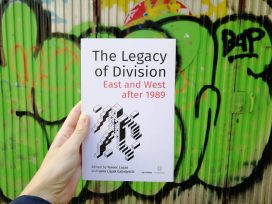
The legacy of division: dual book launch
Watch the discussion of authors and curators #EMCJ31
What is racism against eastern Europeans? And what did Viktor Orbán learn from Slavoj Žižek?
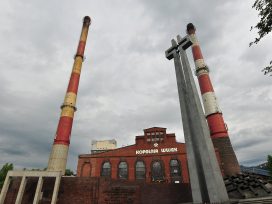
A just transformation?
Why the Polish PiS government is standing up for the Coal Republic
The trauma of the 1990s economic shock therapy reverberates in the Polish resistance against the green transition. The PiS government is demanding the EU finance the climate transformation, leaving them with funds to preserve the iconic coal industry despite its economic failure.



